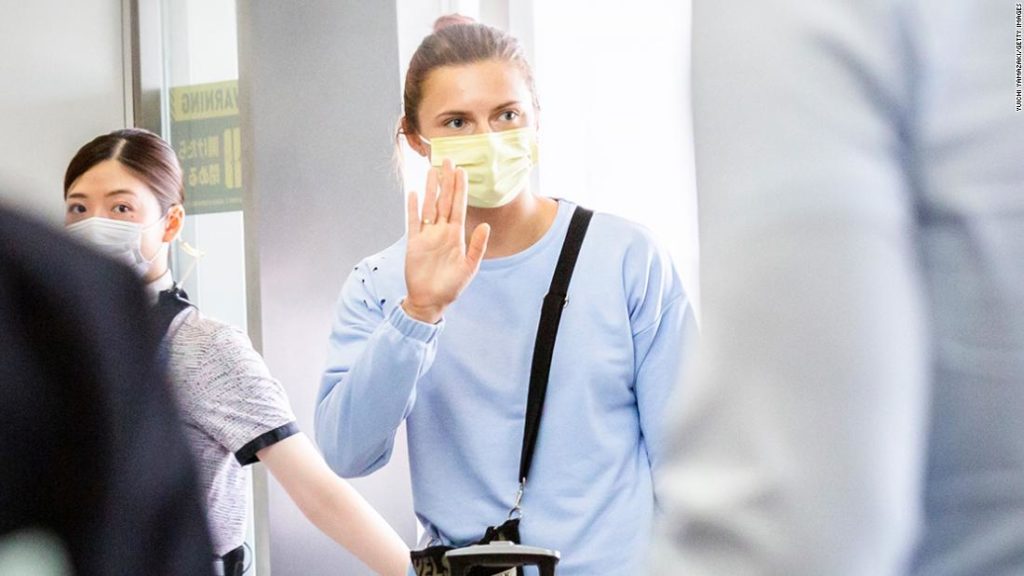Timanovskaya was seen arriving at Tokyo’s Narita airport on Wednesday morning with luggage and wearing blue jeans and a blue sweatshirt. She later boarded Austrian Airlines flight OS52, which took off at 11 a.m. local time.
The athlete had been expected to travel to Warsaw, Poland, where she was offered safe refuge and a humanitarian visa by the country’s Prime Minister. It is not clear if she will make a connection in Vienna on her way to Poland, or if she intends to stay in Austria, or travel elsewhere.
Poland’s Deputy Foreign Minister Marcin Przydacz said in a tweet Timanovskaya, “is being taken care of by the Polish diplomatic service” but “due to security considerations we do not disclose the flight details.”
In an Instagram post, Timanovskaya said team officials made her pack her belongings, saying she was being cut from the Olympic team and flown back to Minsk. She was taken to Haneda airport on Sunday but refused to board the flight from Japan saying she feared for her safety and that she would be jailed in her home country.
Timanovskaya said she was threatened by team officials for going against a decision to enter her into the 4×400 meter relay — an event she had not competed in before — without her consent. She said her trainers didn’t tell her who had made the decision to send her home.
“I was ready for the Games, especially for the 200 meters. They took away my dream of performing at the Olympics. They took this chance away from me,” she said.
International Olympic Committee spokesman Mark Adams said on Wednesday the IOC will open a “disciplinary commission” to establish the facts of the case and as part of that will hear from national head coach Yuri Moisevich and Belarusian sports official Artur Shumak. Adams also said the Belarus National Olympic Committee had submitted a written report on the situation.
On Tuesday, the IOC launched a formal investigation into the incident.
The Belarus NOC said Timanovskaya was withdrawn from the Games due to her “emotional and psychological state.”
Timanovskaya told CNN she realized she may be in danger when she called her grandmother before she was bundled to the airport by team officials.
“She said that I should not go back to Belarus because it was not safe for me there. She said they were saying bad things about me on (state-run) television: That I was ill; that I had psychological problems,” Timanovskaya said.
“My parents understood that if they said those sort of things about me on TV, that I could most likely not return to my home in Belarus… I don’t know where they would take me. Maybe to jail, or maybe, more likely, to a psychological hospital.”
At the airport, Timanovskaya said she used a translation app on her phone to type that she needed help and showed it to a Japanese policeman.
On Tuesday, the activist was found hanged in a forested area of a park near his home. Ukrainian police opened a criminal case and said they would investigate whether Shishov’s death was a suicide or “premeditative murder meant to look like suicide.”
What next for Timanovskaya?
It is unclear where Timanovskaya will end up but several offers have been extended to the athlete. Her husband, Arseni Zdanevich, left Belarus and entered Ukraine on Monday.
Poland’s Prime Minister Mateusz Morawiecki said he spoke with Timanovskaya and assured her she could count on Poland for support. Deputy Foreign Minister Marcin Przydacz told Sky News they expected her to visit Poland and “stay there for at least a couple of days.”
He said Poland has offered her opportunities to pursue her sporting career in the country but “of course (it’s) up to her,” he said.
“We know that her training center is in Austria, and her coach is also placed in Austria. She’s waiting for her husband to join her in Warsaw. So probably it will be their decision, whether they want to stay in Poland or continue any other travel to any other European state and she is very much welcome to stay in Poland.”
Przydacz said it was “most important” Poland stepped in and stopped Belarus from “hijacking people to force them against their will” to return home.
“We gave them an opportunity to live and to come to Poland, safe and secure,” he said.
Poland has received 120,000 visa requests from Belarus since President Lukashenko’s disputed election victory in August last year, Przydacz said.
CNN’s Nick Paton Walsh, Amy Cassidy, Antiona Mortensen, and Gawon Bae contributed to reporting.
You may also like
-
Super League: UEFA forced to drop disciplinary proceedings against remaining clubs
-
Simone Biles says she ‘should have quit way before Tokyo’
-
Kyrie Irving: NBA star the latest to withhold vaccination status
-
Roger Hunt: English football mourns death of Liverpool striker and World Cup winner
-
‘Every single time I lift the bar, I’m just lifting my country up’: Shiva Karout’s quest for powerlifting glory

